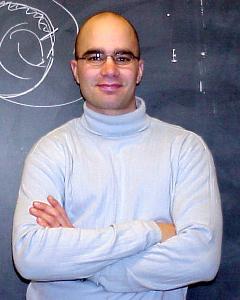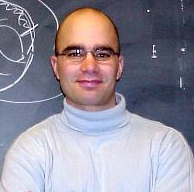St. Thomas mechanical engineering professor John Abraham ignited the blogosphere this June when he posted an online slideshow rebutting a speech by a British climate change skeptic.

The rebuttal would result in harsh words and threats of legal action, but Abraham, who specializes in heat transfer, said he created the online rebuttal because he felt it was his responsibility as a scientist to challenge the content of Lord Christopher Monckton’s speech at Bethel University last October.
“When I listened to the talk, [I thought] someone in the audience who wasn’t trained in the scientific method would come away thinking there’s this big conspiracy, scientists are lying and this global warming isn’t such a big deal,” Abraham said. “One of the things that I’m very passionate about is making sure that science is communicated effectively and honestly to a live audience, and I just didn’t feel that his communication of science was truthful to the intent of the originating scientists.”
Monckton, current deputy leader of the anti-European-Union UK Independence Party and a former journalist, struck back in various ways.
His first response came in the form of letters to St. Thomas officials, including University President the Rev. Dennis Dease, saying Abraham’s presentation is “academically dishonest” and demanding that the university open an academic misconduct investigation.
The debate became even more personal June 24 when Monckton appeared on a syndicated radio talk show and called Abraham a “wretched little man,” St. Thomas a “half-assed Catholic Bible college” and Dease a “creep.”
In response to Monckton’s letters and public comments, St. Thomas’ representative law firm Moore, Costello & Hart wrote to Monckton saying that Abraham “has done nothing improper or illegal” and that he “has not engaged in any academic or professional misconduct.”
The letter also said there would be no investigation, retraction or apology, and threatened legal action if Monckton continued making “disparaging or defamatory comments” about St. Thomas or anyone else associated with the university.
On July 12 Monckton issued his own 99-page rebuttal to Abraham’s presentation. In his rebuttal he asks Abraham to either respond to a total of 466 questions or remove the presentation and issue a public apology for it.
Abraham said he has no desire to continue the public debate with Monckton.
“What I want to do is go back to my research activities and get back to really focusing on classes,” Abraham said. “My dream would be to let my work stand and let him say what he wants, let both of our works stand and let the general public come to their own conclusion over who’s right.”
The university’s position
St. Thomas hasn’t issued a formal statement but is standing behind its professor, said Jim Winterer, university spokesman.
“The university has not been taking steps to send out news releases or somehow take a public stand, although we’re encouraging good science and the kind of debate that goes on in scientific circles,” Winterer said. “We are supporting John Abraham’s research and the way he’s conducted his analysis….He has a civil tone and he’s not making personal attacks.”
About Monckton
Monckton is a hereditary peer also known as 3rd Viscount Monckton of Brenchley. He was a policy adviser to British Prime Minister Margaret Thatcher and is currently chief policy adviser to the Washington-based Science and Public Policy Institute, which disputes the belief that climate change is occurring.
He has argued against anthropogenic climate change in many venues, highlighting what he sees as a lack of scientific consensus on the subject and calling it “unscientific, freedom-destroying nonsense.” His critique of climate change science led him to testify before the U.S. Congress in May.
Libel?
In a recent interview from London, Monckton said Abraham’s presentation was libelous and that he may pursue legal action against the St. Thomas professor.
“It is a systematic, deliberate, serious, malicious libel,” Monckton said. “In Britain, so serious is this libel that it might even be a police matter because in Britain we have a thing called criminal libel.”
Monckton’s threats of legal action are baseless, said Mark Anfinson, an adjunct media law professor at St. Thomas and longtime First Amendment lawyer.
“There’s absolutely no merit whatsoever. It is in fact difficult to express in English just how completely lacking in substance his threats are legally,” Anfinson said. “This is the quintessential type of debate that the First Amendment was adopted to protect, debates and disputes about important social and political issues….The courts would throw this out as fast as they possibly could.”
Public response
The reaction of the greater St. Thomas community has been very positive, Winterer said.
“I’ve heard nothing but support here at St. Thomas for John Abraham and the manner in which he’s handling this,” Winterer said. “We feel he’s really representing the university well in those regards and we’re heartened by letters and e-mails of support from scientists….They’re also appreciative of the tone and the manner in which he’s doing this. It’s not a personal attack; it’s an analysis of the data that’s out there.”
While he’s received positive feedback from people across the world, Abraham said he’s disappointed the issue has become such a controversial topic.
“This is viewed as a really polarizing issue, and I don’t think it needs to be,” Abraham said. “One thing that we really need to be able to do is debate these points without being argumentative. We need to be civil. In that regard, these public debates tend to turn vitriolic pretty quickly, and as soon as that happens, you lose the ability to actually discuss the points.”
Brent Fischer can be reached at bafischer@stthomas.edu.




In the public debate, Professor Abraham certainly comes out on the winning side in being both polite and rational. However, there is more to the issue than just vitrolic exchanges. I am not a scientist and therefore not qualified to issue a comment on global warming, but there seems to be just as many qualified sicientists on both sides of the issue. Science is based on facts and not on single or majority opinion, and apparantly there are substantive facts on both sides. When all of the facts are assessed and confirmed and there is no further room for opinion, then the issue will be settled, and not before. Until then, there is room for both sides to debate without all of the verbal assults.
The actions and reactions of Monckton are, unfortunately, typical of those wanting to force (or foist) their opinions upon the public without debate. Much of what I’ve seen from the far right lately has been exactly this style of intimidation. To a rational person, it should raise serious questions. This is very similar to a recent call by an alumnus who claims UST isn’t “Catholic” enough; or, that the University of Notre Dame should not have let President Barack Obama speak at the 2009 commencement because his opinion on abortion was in conflict with the Church’s stance on this subject. Rational discourse is the basis of educational activity. I support UST’s Professor Abraham and UST’s backing of his work & opinions.
From what I have read elsewhere, Monckton’s training is as a journalist, not a scientist. His comments directed at professor Abraham and UST are clearly meant to be provocative but lend nothing substantive to the discusson on climate change which, “Climategate” notwithstanding, has been largely settled within the scientific community. Our current media landscape allows ex-journalists and various members of the punditocracy to gain traction for views and opinions on climate change that simply don’t have any real bearing in the science. Objectively, that science is no longer really in dispute, even if there is still a great deal of uncertainty as to what the specific long term impacts of climate change may be. Kudos to professor Abraham and UST for standing up for academic rigor.
As a climate skeptic, as someone who hasn’t bought into the self-policed Climategate whitewash — and, for Dan’s benefit, as someone concerned about UST’s Catholic identity AND who thinks Notre Dame should not have given President Obama, the great abortion president, an award — I would like to agree that Lord Monckton is clearly insane. And also hilarious. I had a marvelous laugh about this when it showed up in the Star Tribune. “Half-assed Catholic Bible college?” Calling Fr. Dease — who has had no role in this affair! — “a wimp”? Crike! What a nutter.
On behalf of all climate skeptics (which is a behalf I have no right to take, but I’m doing it anyway), I apologize to Prof. Abraham for letting him get dragged into a fight with a crazy man and his raving conspiracy-theorist followers — and, worse, for the fact that some of my fellow skeptics would give this lunacy a veil of legitimacy.
Keep doing good research, keep having calm discussion, and keep teaching those classes, Professor. With people of good faith working on both sides, the truth — whatever it is — will out in the end. Thanks for your contribution.